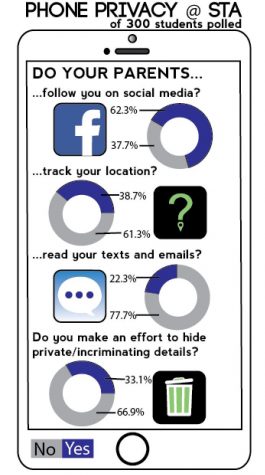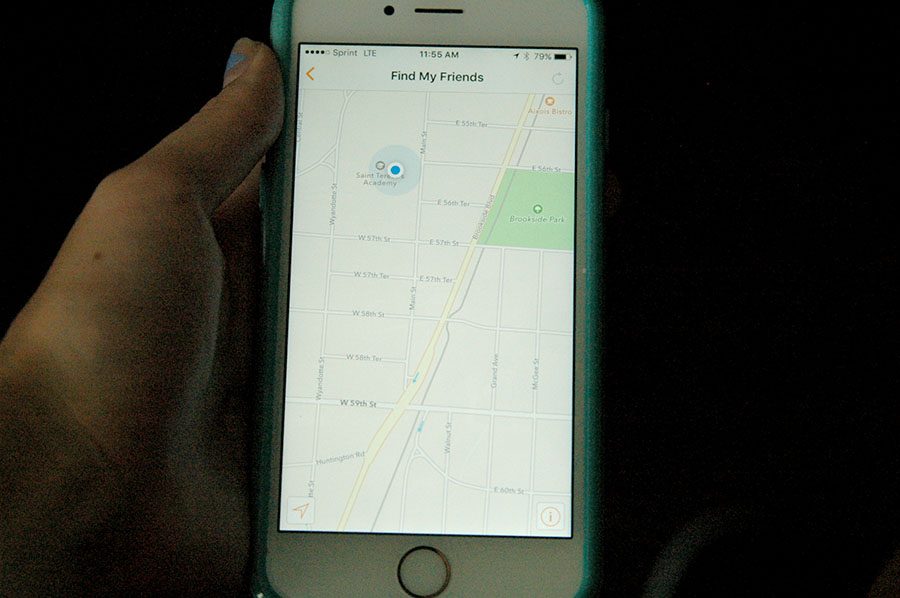Technological privacy is questioned
The Dart takes a closer look into the reasons behind parents tracking students’ phones, and technological privacy regarding the new Surface Pro’s.
A student’s phone displays the app “Find my Friends.” “Find my Friends” is an app that is already downloaded onto an iPhone and is used to track your’s and potential other contact’s locations. photo by Riley McNett
October 22, 2016

Alt-Cov by Julia Kerrigan
Junior Mary Kate Armstrong’s headlights gleam down the mainly empty road of Ward Parkway as the car’s digital clock switches one more antagonizing minute to read 11:08 pm. Already eight minutes past her curfew, she tries to think of excuses to tell her parents as their text messages are sent in 30 second intervals.
“Where are you???”
“Call me now.”
“Are you on your way home?”
“You’re supposed to have your phone charged before you leave.”
“Why isn’t your phone charged?”
Armstrong is one of many STA students that has her cell phone tracked by her parents, so situations like the one above become infrequent occurrences. From a recent study done by Pew Research Center, only 16% of parents with children ages 13-17 use monitoring tools on their teen’s cell phone to track their location. Although a recent phenomenon, apps are quickly developing to give parents the means to keep a close eye on their child with their somewhat new smartphones. Most popular methods include Find My iPhone and Sprint Family Locator. However, there are some specific apps that use the GPS locator on the phone to specifically track family members, such as Find My Kids — Footprints and Family Tracker.
Along with being a time saver, the main reason Matt tracks Armstrong’s phone is for safety reasons, without being too invasive.
“I’d say the vast majority for me is just safety,” Armstrong said. “I try to respect the girls’ freedom and their independence, and there’s never been any issues that would cause me to question those things, so I feel fortunate in that effect.”
Mary Kate says she understands why he does it, but still gets frustrated.
“He wants to make sure that I’m not doing anything that I’m not supposed to be doing, which I completely understand, but usually I’m not. I don’t really do anything ‘bad,’” Mary Kate says. “I agree with him, but at the same time, it’s just annoying because I want to be able to make decisions on my own and not have my parents right behind me saying what I can and can’t do. One day I’m not gonna have them there with me, and I’m gonna have to make decisions on my own, whether it’s a good or bad idea.”
Matt Armstrong believes that many parents often go too far with invading their children’s private world via their cell phone.
“It’s a very regular occurrence for [some parents] to get their kids’ phones, go through their phones, go through their text messages, their pictures, their Instagrams,” Armstrong said. “I don’t think a lot of these parents should interrogate their kids’ phones because it’d be the equivalent in my time frame of going through my daughter’s journal or something along those lines, it’s a very personal thing.”
Although the phone is easily accessible, Armstrong explained how parents don’t have to go to such extreme odds to find out more about their children, instead, they can attempt much simpler methods.
“For a lot of people these days, their phones have become a combination of things that used to exist separately, like albums, journals, planners, and things along those lines, that it’s probably tempting to go this one-stop shop where I can get all of these things,” Armstrong said. “But the girls, their mom and I have a reasonable amount of conversation around things that are going on, and the girls also develop the trust that as long as they’re sharing what’s going on and what their thoughts are, there’s not as much need to go in and look at these things.”
Guidance counselor Kelly McKee also tracks her daughter Ruthie, viewing it strictly for safety reasons and using it infrequently.
“I think with [my mom’s] attitude towards it, it’s fine, because I know that she’s not gonna be keeping tabs on my every move,” junior Ruthie McKee said.
Kelly has a similar approach to keeping a healthy relationship with her kids, without hovering.
“I trust my girls…I would much rather monitor and engage with them personally to find out their plans and where they plan to go and what they’re doing. I think in the event of an emergency, it’s a nice option to have, but I really don’t think of it as an option on a regular basis,” Kelly said.

Illustration by Ellie Grever
However, some families don’t have that level of trust as the level developed in the Armstrong and McKee families- whether developed from an action done by the kid to receive more “hovering” from the parents, or the parents just being more anxious people in general. Oftentimes, parents feel that it is the only way they can get an idea of what is going on in their child’s life, when in McKee’s opinion, it could result in creating more distance between the parent and child.
“It could come between a parent-child relationship in the sense that a child might not feel that their parents trust them if they feel like they hover and track their every move,” McKee said.
Sophomore Jordan Klumb also has a parent who expresses concern with safety and tracks her and her brother’s phones to look out for what they’re doing.
“She tracks [my brother] so much, because he’s 16, so he can drive everywhere,” Klumb says. “So he always gets food and is hanging out with his friends, and she texts him asking ‘why are you here?’”
Many kids are coming up with ways to maneuver around it, some simple while others are complex.
“Sometimes my brother turns his phone off so she can’t track it,” Klumb said. “Or if his phone died, it’s obviously not gonna work, but she thinks he turned it off on purpose.”
In an era of constantly evolving technology, parenting today has adapted to methods not available in the eighties. STA theology teacher and parent Jennifer Greene remarks on the difference that recent technology makes in a teenager’s life.
“Looking back, [tracking] would have benefited me. Maybe I would have made some better decisions.”
Mark Armstrong also contemplates his life as a teenager if his parents had the means.
“None of this technology existed when I was a kid, and if it did I wouldn’t want my parents tracking every single movement.”
photos by Riley McNett and Catherine Ebbitts
[nggallery id=1267]
BEYOND CELL PHONES
Though a teenager’s main device is usually a smartphone, computers and the Internet generate more questions about privacy. STA’s recent switch from netbooks to Surface Pros sparks old questions about what remains private on school-issued technology.
According to Zimmerman, administration can access information like who last logged into it, where it is based on WiFi location, what is installed, and Internet history.
Regarding general privacy on the Internet, Internet Support employee George Zimmerman believes today’s technology is complicated and makes it easy to give away information, like allowing a company to track you online.
“Very few people read the clauses of Acceptable Use Policies or User Agreements that may contain phrases about allowing the issuer rights to record, track and/or monitor you,” Zimmerman writes. “It is also even easier to think you are secure, let your guard down and assume that technology will keep you safe.”
Zimmerman recommends putting as little as possible online.
“Be very, very selective about the information you make available online – even if you think it is secure with platforms such as Facebook,” Zimmerman writes. “Keep in mind that once you put anything out on the internet it is always on the internet; there is no real way to “erase” anything. It is very scary what people, or even computers, can do with technology today. An example would be if you link your name to a picture in one place (such as Facebook) and it gets ‘indexed’ by a facial program – then it is possible for you to be identified in other photographs, even ones posted by others and not yourself.”
With technology updating itself quicker than ever, it’s important to remember the effects it can have. While uploading what you think will be a 24 hour Snapchat story, always think of Zimmerman’s advice first:
“Be aware, be cautious, question your actions before you act and always, always ask questions.”
Right On Target: Do you feel like it is okay for parents to go through their kid’s social media and phones?
Kathleen Graham (11): I think that it is okay for parents to follow their kids on social media, my parents do just because they like to see what I post and what is going on in my life. However, I think it is an invasion of privacy for them to go through their kid’s phones.
Aryanna Wyatt (10): My parents don’t personally go through my phone or social media but I think it is an invasion of personal space because it is my own personal and private business.
Emilie Blanck (11): I think it’s okay if the parents feel that there’s something that their kid is hiding that could possibly get them in trouble, but if there is no reason to, then it is an invasion of privacy.










